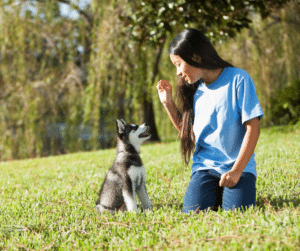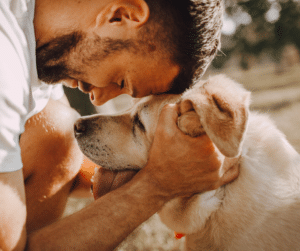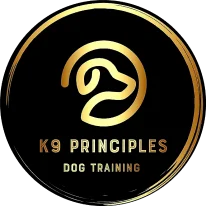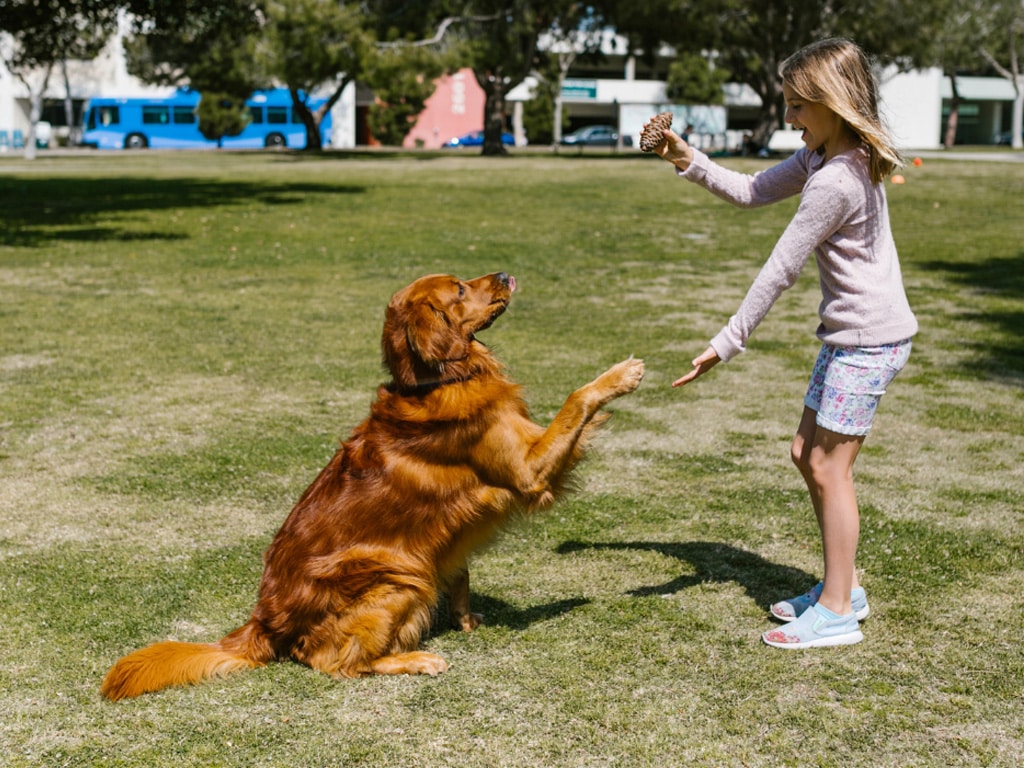The Biggest Myths About Dog Training: Debunked by Professionals
Dog training is one of the most rewarding and essential aspects of being a dog owner. But for first-time owners, the sea of misinformation can feel overwhelming. That’s why we at K9 Principles are here to shed light on the biggest myths about dog training. By the end of this article, you’ll not only know what’s true and what’s not but feel confident taking your first steps into the wonderful world of training your dog.
The Truth About Dog Training Myths
Myths about dog training stick around because they’re easy to believe, often stemming from outdated practices or misunderstandings. They’re passed along in casual conversations, shared in social media posts, or even perpetuated by well-meaning but misinformed individuals. But the reality? These misconceptions can create confusion, delay training, and even harm the bond between you and your dog. Let’s clear up these myths one by one so you can make informed decisions for your dog.
You Can’t Teach an Old Dog New Tricks
It’s a saying we’ve all heard, right? But it couldn’t be further from the truth. Dogs, regardless of age, are constantly learning. Whether your dog is a spry one-year-old or a calm eight-year-old, they can learn new cues and behaviours with consistent, positive training methods.
Why does this myth persist? Many people assume that older dogs are too set in their ways or lack the energy to engage in training. The reality is quite different. Older dogs might even have an advantage over their younger counterparts. They’re often calmer, more focused, and less distracted by their surroundings, making them ideal students for learning new skills.
At K9 Principles, we’ve seen countless older dogs thrive in training, proving that age is just a number. Whether it’s teaching a senior dog basic manners or introducing them to advanced skills like recall or loose lead walking, we’re here to guide you every step of the way.

Only Certain Breeds Are Trainable
It’s easy to think some breeds are “smarter” or “easier” to train than others. While breeds like Border Collies and German Shepherds are often touted as quick learners, it’s important to remember that trainability depends on more than genetics. Every dog has unique traits, motivations, and quirks.
For example, while a Labrador might eagerly respond to food rewards, a terrier might need a more playful approach. Hounds, known for their independence, may require extra patience, but their achievements are just as rewarding. The key is understanding what drives your dog and tailoring training to meet their needs.
At K9 Principles, we don’t believe in a one-size-fits-all approach. Instead, we focus on understanding your dog’s personality, preferences, and natural instincts. With our guidance, you’ll learn how to harness your dog’s strengths and work through their challenges.
Puppies Shouldn’t Start Training Until Six Months Old
Waiting until a puppy is six months old to start training is like waiting until a teenager is 18 to teach them manners—it’s too late! Puppies are like little sponges, soaking up everything around them. Starting training early with our Starter Program helps them learn good habits before bad ones set in.

Think about it: teaching a puppy to sit, stay, or come when called is much easier than unteaching behaviours like jumping on guests or chewing shoes. Early training also provides critical socialisation, helping puppies feel comfortable around people, other dogs, and various environments. The first few months of a puppy’s life are a golden opportunity to shape their behaviour positively.
At K9 Principles, we believe in starting training as soon as your puppy joins your family. From foundational skills to socialisation tips, we’ll help you raise a well-behaved and confident pup.
Dogs Will Grow Out of Bad Behaviour
If you’ve ever thought, “Oh, they’ll grow out of it,” you’re not alone. But unfortunately, dogs don’t magically stop jumping, barking, or pulling on the lead as they age. Without proper training, these behaviours often become ingrained and harder to manage.
Imagine having a child who throws tantrums and never being taught how to behave. Dogs, like children, need guidance to understand what’s expected of them. They’re not being “bad”—they’re simply behaving in ways that make sense to them. It’s our job to teach them appropriate alternatives.
That’s where we come in. At K9 Principles, we help you address behavioural issues early, setting your dog up for success and strengthening your bond along the way.
Training Should Only Be Done by Professionals
While professional dog trainers play a crucial role in setting the foundation, you are the key to your dog’s success. Training isn’t just about the sessions with us—it’s about what happens every day in your home, on your walks, and during playtime.
The idea that only professionals can train dogs often stems from a lack of confidence. Many first-time owners worry they’ll do something wrong. But the truth is, with the right guidance and support, anyone can train their dog.
Professional dog trainers like us provide you with the tools, techniques, and knowledge to continue the work at home. Think of us as your coaches—guiding you, cheering you on, and helping you troubleshoot when challenges arise. With consistency and practice, you’ll see incredible progress.
Moreover, professional training isn’t about taking over or excluding you from the process; it’s about collaboration. We work with you to ensure you feel confident and equipped to reinforce your dog’s training in everyday situations. Whether it’s teaching your dog to walk calmly on a lead or addressing specific behavioural challenges, the training continues at home, where the real progress happens.
At K9 Principles, we believe that empowering owners is as important as training the dog itself. By partnering with a professional dog trainer in Hamilton, you gain not only a well-behaved dog but also the skills and confidence to handle future challenges on your own. Together, we’ll create a lasting bond between you and your dog.
Rescue Dogs Are Too Traumatised to Train
Rescue dogs often come with histories we may never fully understand. But trauma doesn’t mean they’re untrainable—it just means they need patience, compassion, and a tailored approach.
One of the most rewarding aspects of working with rescue dogs is seeing their transformation. They might start off shy, fearful, or reactive, but with trust-building exercises and gradual training, they often surprise their owners with their progress.

Trust-building is a crucial first step. This might involve simply sitting with your dog and letting them come to you on their terms. Rescue dogs often carry emotional baggage, and giving them the space to feel safe can work wonders. Over time, small victories, such as responding to their name or walking calmly on a lead, can pave the way for bigger achievements.
Training a rescue dog also involves understanding their triggers and working through them patiently. For example, a dog who fears loud noises may benefit from desensitisation techniques and gradual exposure in a controlled environment. Similarly, a rescue dog who is wary of strangers might need careful socialisation efforts to build confidence.
Rescue dogs are often highly motivated to please once they form a bond with their owner. This deep connection can make the training process incredibly rewarding. Not only do you get to witness their growth, but you also build a partnership based on trust and mutual respect.
At K9 Principles, with our partnership with the Hamilton/Burlington SPCA, we’ve worked with countless rescue dogs who’ve blossomed into well-mannered, happy companions. Whether it’s teaching basic obedience or helping a dog overcome past trauma, we’ll guide you every step of the way. Together, we’ll turn challenges into triumphs and show you that every rescue dog has the potential to thrive.
Obedience Training Is Only for ‘Problem Dogs’
This myth is one we hear far too often. Training isn’t about fixing problems; it’s about creating opportunities. A well-trained dog enjoys freedom, safety, and a stronger bond with their owner.
Imagine being able to trust your dog off-lead in a park or having a dog who comes running back when called. Training doesn’t just make life easier—it enhances every aspect of your relationship with your dog.
Obedience training also provides mental stimulation, which is just as important as physical exercise. Dogs that are challenged mentally are happier, more relaxed, and less likely to develop destructive behaviours. This mental workout doesn’t have to be complicated—simple activities like teaching new cues, engaging in hide-and-seek games, or solving food puzzles can make a big difference.
Moreover, obedience training isn’t about strict rules or rigid routines. It’s about creating a language that you and your dog share, allowing for better communication and understanding. Through training, you build trust and a deeper connection, which can lead to a more harmonious life together.
Even dogs without behavioural issues can benefit from training. Teaching fun tricks, agility skills, or advanced obedience tasks keeps their minds sharp and enriches their lives. It also makes daily life more enjoyable for you as their owner.
At K9 Principles, we believe every dog deserves the chance to learn and thrive. Whether it’s mastering basic manners or exploring advanced skills, training is an investment in a brighter, more fulfilling future for both you and your dog.
Training Is Expensive and Time-Consuming
We understand the concerns about cost and time, but training is an investment in your dog’s future. A well-trained dog is less likely to develop behavioural issues, which can save money on repairs, vet bills, and professional help down the road.
Plus, training doesn’t have to be a chore. Short, fun sessions integrated into your daily routine can make a huge difference. For example, practising a sit or stay while you’re cooking dinner or doing a quick recall game during a walk can be incredibly effective.
Budget-friendly options, such as group classes, can also provide valuable guidance without breaking the bank. The key is consistency and making training a natural part of your day.
Additionally, the long-term benefits of training far outweigh the initial investment. A well-trained dog is a joy to live with—fewer behavioural issues mean less stress and more enjoyable experiences together. Think of the relief of knowing your dog won’t dash off unexpectedly or the pride of having a dog that behaves impeccably around guests.
Time-wise, training doesn’t have to be a massive daily commitment. Even just ten minutes a day can yield impressive results over time. The key is to make these sessions consistent and engaging for your dog.
At K9 Principles, we’ll show you how to make training affordable, enjoyable, and time-efficient. With our help, you’ll see that the rewards far outweigh the costs. The bond you’ll build with your dog through training is priceless, and the peace of mind that comes with a well-trained dog is truly invaluable.
Conclusion
By debunking these myths, we hope to empower you as a first-time dog owner. Training isn’t about perfection; it’s about progress, patience, and partnership. At K9 Principles, we’re here to guide you every step of the way, ensuring your dog becomes the best version of themselves.
- Name: K9 Principles
- Address: Haldimand County, Greater Hamilton Area, Burlington, and Most of Norfolk County
- Phone: 289 880-3382
- Email: k9principlesinc@gmail.com
- Website: www.k9principles.ca
FAQs
-
A. The earlier, the better! Puppies can start training as soon as they arrive home.






